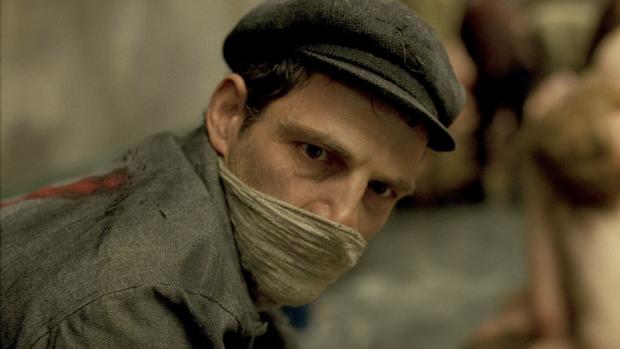Need to Know: Son of Saul
If I’ve ever heard a more chilling line of dialogue in a film than this one, I can’t think what it was: “Hurry up or the soup will get cold!”
Of course context is everything. The line is yelled by a guard to a bunch of arrivals being processed. They think that they are going to be put to work as they are rushed along, parted from whatever possessions they have, stripped and sent to showers for delousing. That hot soup awaits them when they get out, the guard assures them.
But we know better. This is Auschwitz-Birkenau, the Nazi facility for the execution and disposal of prisoners in the final days of World War II. Whatever capacity it was designed for is presently being exceeded: Jews and other unwanted sorts are being shipped here faster than they can be, in the bland verb employed, “treated.”
Here’s how hellishly efficient that murder machine was: it even found a way to make a segment of the prisoners into participants. They were called the Sonderkommando, and they assisted the Nazis in processing their fellows to their deaths. Their reward? They got to live a little longer, in slightly less miserable conditions.
Saul is one of these, and he is our guide through this system. Throughout Son of Saul, the astonishing and disturbing debut film of Hungarian director Laszlo Nemes, the camera seldom moves very far from him. It stays on his expressionless face as he and we hear those people herded into the showers beginning to understand what is really happening, raising their voices and beating their fists against the walls.
Shot in a cramped aspect ratio in shallow focus, Son of Saul stays with Saul for the two days covered by the story. We learn many details of the operation of the camp that may not previously have occurred to us, were we to want to go past the near impenetrable obscenity of its mere existence. How to dispose of so many bodies, for instance? We know there was a crematorium there, but even cremation leaves ashes.
Around this point you may well be saying to yourself, why would I want to see such a film? That’s something I can’t answer for you. It has been made with enormous skill that diverts you from noticing it. It must have been extremely difficult for the camera operator, who seldom if ever gets more than a few feet away from Saul, to maintain this degree of fluidity without ever calling attention to itself. It never forces you to look at too much, knowing to pull back when you have sufficient information.
If anything, it gives you too little information to answer questions you may have. The title refers to a terrible discovery Saul makes: the corpse of his teenage son. He becomes determined to save it from the crematorium and provide it a proper Jewish funeral. But how he came to be separated from the boy, or if there are other family members, we never learn.
It takes a while for us to understand that as Saul sets about his task his fellow prisoners are at work of a scheme of their own. These two story lines exist, I think, primarily to give us something to pay attention to as a relief from the burden of concentrating on the horrors of the situation, presented as barely controlled chaos. It is, for lack of a better word, exciting, to use one of the words we often apply to a movie that has made an impact on us. Most of the others don’t apply.
If you are a seasoned filmgoer, you have probably seen more than a few films about this black spot in history. If not, this one easily stands in for all the other.

